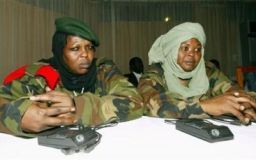No progress in Darfur peace talks
May 1, 2006 (ABUJA) — The first day of an extended deadline for reaching a peace deal in Sudan’s Darfur region saw no progress Monday, and the State Department said its No. 2 official is flying to Nigeria in hopes of prodding the rival factions.
 Rebels are still pushing the government to accept their demands for autonomy and a vice president.
Rebels are still pushing the government to accept their demands for autonomy and a vice president.
African Union mediators who wrote a draft agreement gave the two sides until midnight Tuesday to formally end a conflict that has killed tens of thousands of people and displaced millions. Talks have been going on for two years.
“We are not ready to sign until the Sudanese give concessions to our demands,” Ahmed Hussein, a spokesman for one of two rebel factions, said Monday.
In rejecting the AU draft, he said he was speaking on behalf of both his Justice and Equality Movement and the other main rebel group, the Sudan Liberation Movement.
The government said Sunday it was ready to sign the deal, and spokesman Abdroman Zuma repeated that Monday morning.
Deputy Secretary of State Robert Zoellick is flying to Nigeria in an effort to break the impasse.
“The parties have made progress in recent days, but some key issues remain unresolved,” the State Department said Monday.
“The United States urges the Darfur rebel movements to focus on the few key issues that stand in the way of reaching a settlement, and we urge the government of Sudan to send a senior representative back to Abuja to finalize the peace agreement.”
Among other provisions, the draft circulated last week called for a cease-fire. Both sides have agreed to a truce before, only to keep fighting, even in the last week. The draft also calls for an infusion of funds into a region the draft document described as “historically deprived.”
It also addressed complaints from Darfur rebel groups that they had been neglected by the national government, calling for the president to include a Darfur expert, initially nominated by the rebels, among his top advisers.
But the Justice and Equality Movement said the proposal does not adequately address implementation nor their key demands for a vice president from Darfur and more autonomy.
Salim Ahmed Salim, a lead mediator for the AU, said the bloc had bowed to requests from the United States and others to continue negotiations.
“The African Union has extended the deadline of the peace talks by 48 hours as requested by the United States and other international partners to allow extensive consultations to go ahead,” he said at the talks’ site in Nigeria’s capital, Abuja.
In Washington, actors, athletes, politicians and religious leaders rallied Sunday to call attention to the Darfur conflict and urge greater U.S. involvement in ending what the United Nations has called one of the world’s worst humanitarian disasters.
Years of fighting between ethnic groups and Arab militias in western Sudan have left at least 180,000 people dead and about 2 million homeless. Darfur’s violence recently spilled into neighboring Chad and threatens to escalate: Osama bin Laden last week urged his followers to go to Sudan to fight a proposed U.N. presence.
Amid the negotiations, the plight of 3 million refugees in Darfur has worsened. The U.N. World Food Program said Friday it was cutting rations in half, citing a lack of funds.
An agreement between Sudan and the rebels likely would be seen as a triumph of African diplomacy. The talks have been organized by the 53-nation African Union, with key participation from leaders from South Africa and Nigeria.
Sudan has indicated it might accept a U.N. force in Darfur to aid AU troops if a peace treaty is signed.
In the draft, mediators also proposed that the people of Darfur vote by 2010 on whether to create a single geographical entity out of the three Darfur states, which would presumably have more political weight.
Decades of low-level tribal clashes over land and water in Darfur erupted into large-scale violence in early 2003 when some ethnic groups took up arms, accusing the east African nation’s Arab-dominated central government of neglect.
The central government is accused of responding by unleashing Arab tribal militias known as Janjaweed to murder and rape civilians and lay waste to villages. Sudan denies backing the Janjaweed.
The draft agreement calls for disarming the Janjaweed and integrating some rebels into the national army and security forces.
(ST/AP)
